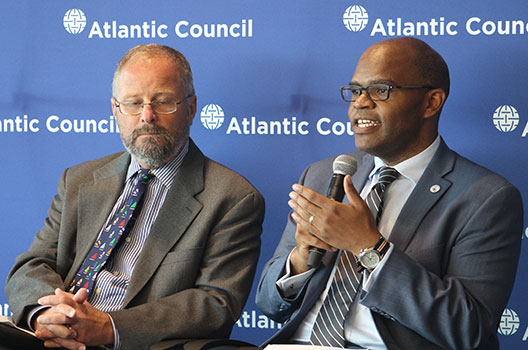 The International Republican Institute’s (IRI) Nigeria Country Director Sentell Barnes likes to describe Nigeria as a house.
The International Republican Institute’s (IRI) Nigeria Country Director Sentell Barnes likes to describe Nigeria as a house.
“When you see it from the outside, maybe it looks like it’s falling in. But when you see it from the inside, there are things in place where the country is preventing itself…from going off the edge,” said Barnes.
Barnes joined John Tomaszewski, Africa regional director for IRI and Robert Carpenter, an international polling consultant, at the Atlantic Council on July 14 for an event co-hosted by the Council’s Africa Center and IRI. Bronwyn Bruton, deputy director of the Africa Center, moderated the discussion.
“Nigeria is very much in the news for all the wrong reasons,” noted Bruton.
The country faces a litany of security challenges: terror group Boko Haram continues to menace the country’s northeast and certain parts of neighboring Chad, Niger, and Cameroon; former militants in the oil-producing Niger Delta are growing restless amid uncertainty over whether long-running amnesty payments will continue; and violent land disputes between cattle herders and farmers in the country’s Middle Belt region have killed and displaced thousands of people.
Despite being Africa’s most populous country and hosting the continent’s largest economy, Nigeria’s economic woes include rising inflation, foreign exchange shortages, and plummeting government oil revenues. Corruption, which Barnes described as the “elephant in the room,” remains a serious problem.
But against the backdrop of these challenges remains an enduring optimism, IRI’s recent Nigeria poll found. Fifty-four percent of Nigerian respondents believed the country was headed in the right direction; in the north, that number was sixty-eight percent.
Recent polling suggests a stark reversal from five years ago. In November of 2011, a similar poll found that fifty-six percent of Nigerians believed their country was headed in the wrong direction.
Much has happened since 2011 to move the needle on public opinion. In 2015, Muhammadu Buhari defeated incumbent president Goodluck Jonathan in a free and fair election. The subsequent handover was the first peaceful political transition since the end of military rule in 1999.
“Democracy has shown that it has legs,” said Barnes.
“There is really this belief that democracy brings economic prosperity,” he added.
A second conclusion from the survey was the perception of improved security throughout the country. An overwhelming majority of respondents—eighty-one percent—said that they felt safe in their communities.
“There is a sense of progress, and that things are moving forward,” Tomaszewski said—though he noted disparities in how safe Nigerians feel, depending on where they live.
Barnes stressed the poll’s importance to IRI’s programming throughout Nigeria, and specifically, the organization’s work in strengthening Nigeria’s political parties.
“[We tell parties that] you can’t be so one-dimensional that you miss out on the important issues,” said Barnes, noting IRI’s assistance to Nigerian political parties in running comprehensive and issue-based campaigns.
Surveying a country of 173 million—not to mention populations known to speak an estimated five hundred indigenous languages—is no easy feat. Pollsters called more than thirteen-thousand people. They received eight-thousand answers to questions ranging from the state of democracy to respondents’ personal feelings on their safety and economic security. Surveyors made a strong effort to include diverse geographies and income levels, as well as an even male-female split.
The panelists suggested that future studies might focus specifically on polling Nigeria’s vulnerable groups—including the more than two million internally displaced persons and people with disabilities.
Kelsey Lilley is an associate director with the Atlantic Council’s Africa Center.
Image: From left: Robert Carpenter, an international polling consultant, joins Sentell Barnes, Nigeria Country Director for the International Republican Institute, for a discussion at the Atlantic Council on July 14 on Nigerian polling results on the country’s security and economy. (Atlantic Council/Julian Wyss)
